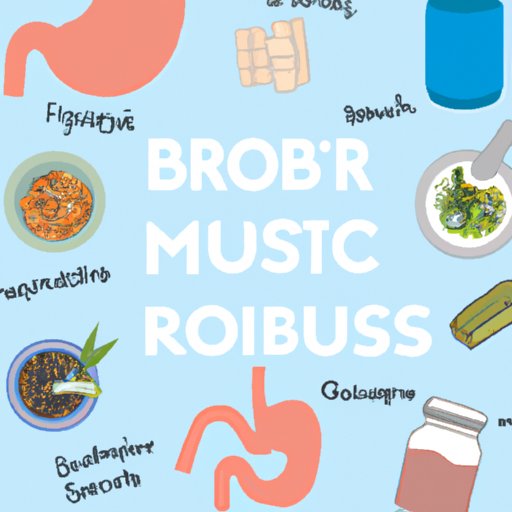Introduction
Bloating is an uncomfortable feeling of fullness, tightness, and swelling in the abdomen that can cause pain and discomfort. It’s a common problem that many people experience, especially after working out. In this article, we’ll explore the causes of post-workout bloating, the science behind it, and provide tips and solutions to reduce or eliminate it.
The Causes of Bloating After Exercise
There are several potential causes of bloating after exercise. According to nutritionist Dr. Rupali Datta, “Poor digestion, eating too much or too quickly, drinking too much water, eating high-fiber foods, and intense exercise can all contribute to bloating.”
Understanding the Science Behind Post-Workout Bloating
When you exercise, your body diverts blood away from your digestive system to your muscles, which can slow down digestion. Additionally, if you eat before or after exercising, the food may not be digested properly, leading to bloating. And if you drink too much water at once, your body may not be able to absorb it as quickly as it needs to, resulting in water retention and bloating.

Tips for Reducing Bloating After Working Out
If you want to reduce or eliminate post-workout bloating, there are several things you can do. First, make sure you’re drinking plenty of water throughout the day and avoid drinking too much at once. Second, eat smaller meals, as larger meals take longer to digest and can contribute to bloating. Third, try to avoid high-fiber foods, as they can be difficult to digest and can lead to bloating. Finally, don’t over-exert yourself while exercising, as this can put extra strain on your digestive system.

Nutrition Strategies to Help Avoid Bloating After Exercise
In addition to the tips mentioned above, there are certain nutrition strategies you can use to help reduce bloating after exercise. First, make sure you’re eating slowly and chewing your food thoroughly. This will help ensure that your food is being properly digested. Second, avoid carbonated drinks, as these can cause gas and bloating. Third, consider taking probiotics, as these can help support healthy digestion. Finally, incorporate fermented foods into your diet, as these contain beneficial bacteria that can help reduce bloating.

How to Manage Gas and Bloating After Exercise
If you find yourself feeling gassy and bloated after a workout, there are several things you can do to help manage the symptoms. First, move around after eating to help aid digestion. Second, practice deep breathing exercises, as this can help relieve tension in the abdomen. Third, try doing some gentle yoga or stretching to help release gas. Finally, try lying down on your left side with your knees bent to help ease any discomfort.
Are There Natural Remedies for Bloating After Working Out?
Yes, there are several natural remedies that can help reduce bloating after exercise. Herbal teas such as peppermint, ginger, and chamomile can be soothing and help reduce bloating. Apple cider vinegar helps balance the pH in the stomach, which can help reduce gas and bloating. And ginger has anti-inflammatory properties that can help reduce bloating and ease stomach discomfort.
How to Tell if Your Bloating is Normal or a Sign of Something More Serious
It’s important to pay attention to your body and be aware of any changes. If you’re experiencing bloating after exercise, keep track of how often it happens and how severe it is. If you’re concerned, consult with a doctor to rule out any underlying conditions that could be causing the bloating.
Conclusion
Bloating after exercise is a common problem that can be caused by a number of factors, including poor digestion, eating too much or too quickly, drinking too much water, and eating high-fiber foods. However, there are several steps you can take to reduce or eliminate bloating after exercise, such as drinking plenty of water, eating smaller meals, avoiding high-fiber foods, and incorporating probiotics and fermented foods into your diet. If you’re concerned about persistent bloating, it’s always best to consult with a doctor.
(Note: Is this article not meeting your expectations? Do you have knowledge or insights to share? Unlock new opportunities and expand your reach by joining our authors team. Click Registration to join us and share your expertise with our readers.)
